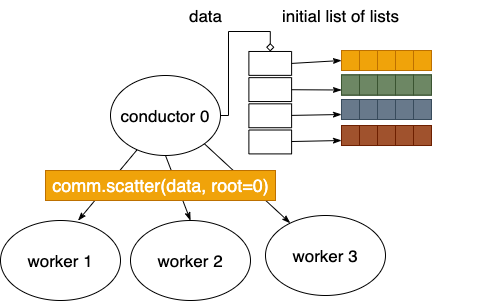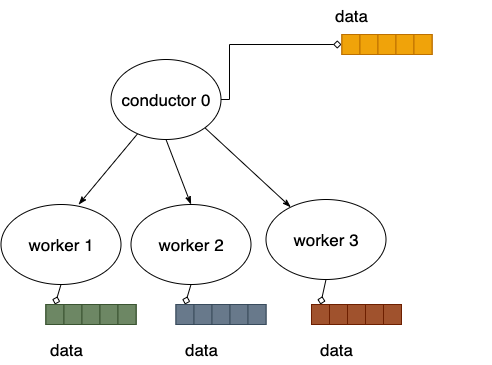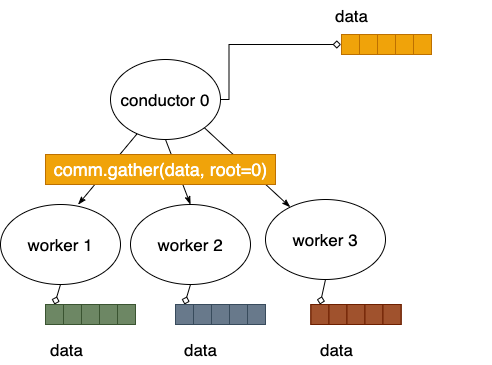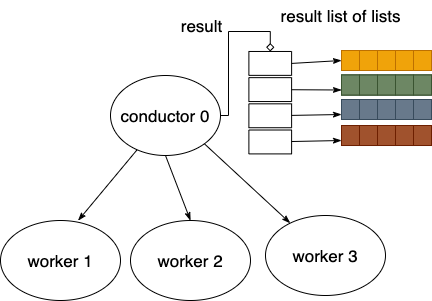7.1. Collective Communication: scatter and gather lists¶
When several processes need to work on portions of a data structure, such as a 1-d or 2-d array, at various points in a program, a way to do this is to have one node, usually the conductor, divide the data structure and send portions to each of the other processes, often keeping one portion for itself. Each process then works on that portion of the data, and then the conductor can get the completed portions back. This type of coordination is so common that MPI has special patterns for it called scatter and gather.
7.1.1. Scatter Arrays¶
The following diagrams illustrate how scatter using python list structures works. The conductor contains a list of lists and all processes participate in the scatter:

After the scatter is completed, each process has one of the smaller lists to work on, like this:

In this example, some small lists are created in a list whose length is as long as the number of processes.
Navigate to: ../14.scatter/
Make and run the code:
make
mpirun -hostfile ~/hostfile -np N ./scatter
Here the N signifies the number of processes to start up in mpi.
Exercises:
Run, using N = from 2 through 8 processes. Trace execution through source code.
Explain behavior/effect of MPI_Scatter().
7.1.1.1. Explore the code¶
Note
In the code below, note how all processes must call the scatter function.
#include <mpi.h> // MPI
#include <stdio.h> // printf(), etc.
#include <stdlib.h> // malloc()
void print(int id, char* arrName, int* arr, int arrSize);
int main(int argc, char** argv) {
const int MAX = 8;
int* arrSend = NULL;
int* arrRcv = NULL;
int numProcs = -1, myRank = -1, numSent = -1;
MPI_Init(&argc, &argv); // initialize
MPI_Comm_size(MPI_COMM_WORLD, &numProcs);
MPI_Comm_rank(MPI_COMM_WORLD, &myRank);
if (myRank == 0) { // conductor process:
arrSend = (int*) malloc( MAX * sizeof(int) ); // allocate array1
for (int i = 0; i < MAX; i++) { // load with values
arrSend[i] = (i+1) * 11;
}
print(myRank, "arrSend", arrSend, MAX); // display array1
}
numSent = MAX / numProcs; // all processes:
arrRcv = (int*) malloc( numSent * sizeof(int) ); // allocate array2
MPI_Scatter(arrSend, numSent, MPI_INT, arrRcv, // scatter array1
numSent, MPI_INT, 0, MPI_COMM_WORLD); // into array2
print(myRank, "arrRcv", arrRcv, numSent); // display array2
free(arrSend); // clean up
free(arrRcv);
MPI_Finalize();
return 0;
}
void print(int id, char* arrName, int* arr, int arrSize) {
printf("Process %d, %s: ", id, arrName);
for (int i = 0; i < arrSize; i++) {
printf(" %d", arr[i]);
}
printf("\n");
}
7.1.2. Gather Arrays¶
Once several processes have their own arrays of data, those can also be gathered back together into a larger array, usually in the conductor process. All processes participate in a gather, like this:

The gather creates a list of lists in the conductor, like this:

In this example, each process creates some very small arrays. Then a gather is used to create a larger array on the conductor process.
Navigate to: ../15.gather/
Make and run the code:
make
mpirun -hostfile ~/hostfile -np N ./gather
Here the N signifies the number of processes to start up in mpi.
In this example all processes have a small array of values, whose length is indicated by SIZE, and the conductor has an additional larger one.
Exercises:
Run, using N = from 2 through 8 processes.
Trace execution through source.
Explain behavior of MPI_Gather().
Try with different values of SIZE, perhaps changing printing of result for readability.
7.1.2.1. Explore the code¶
Note
In the code below, note how all processes must call the gather function.
#include <mpi.h> // MPI
#include <stdio.h> // printf()
#include <stdlib.h> // malloc()
void print(int id, char* arrName, int* arr, int arrSize);
#define SIZE 3
int main(int argc, char** argv) {
int computeArray[SIZE]; // array1
int* gatherArray = NULL; // array2
int numProcs = -1, myRank = -1,
totalGatheredVals = -1;
MPI_Init(&argc, &argv); // initialize
MPI_Comm_size(MPI_COMM_WORLD, &numProcs);
MPI_Comm_rank(MPI_COMM_WORLD, &myRank);
// all processes:
for (int i = 0; i < SIZE; i++) { // load array1 with
computeArray[i] = myRank * 10 + i; // 3 distinct values
}
print(myRank, "computeArray", computeArray, // show array1
SIZE);
if (myRank == 0) { // conductor:
totalGatheredVals = SIZE * numProcs; // allocate array2
gatherArray = (int*) malloc( totalGatheredVals * sizeof(int) );
}
MPI_Gather(computeArray, SIZE, MPI_INT, // gather array1 vals
gatherArray, SIZE, MPI_INT, // into array2
0, MPI_COMM_WORLD); // at conductor process
if (myRank == 0) { // conductor process:
print(myRank, "gatherArray", // show array2
gatherArray, totalGatheredVals);
free(gatherArray); // clean up
}
MPI_Finalize();
return 0;
}
void print(int id, char* arrName, int* arr, int arrSize) {
printf("Process %d, %s: ", id, arrName);
for (int i = 0; i < arrSize; i++) {
printf(" %d", arr[i]);
}
printf("\n");
}
